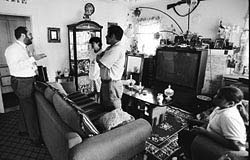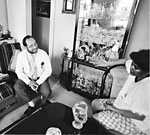|
|
|
Riding Along with
Bilingual Worker Frederick Machado
Sept. 2000
by Richard Bermack
 The
stress, strains, and pressures from a rapidly changing culture turn many
family homes into pressure cookers. Imagine being an immigrant from a
culture with an intact family life, based on traditional, non-materialistic
religious values and fixed parental authority, trying to do the best for
your teenage children, who claim that they need to dye their hair orange,
stay out late, and act out TV culture. And to make matters worse, they
speak the language and you don't. The
stress, strains, and pressures from a rapidly changing culture turn many
family homes into pressure cookers. Imagine being an immigrant from a
culture with an intact family life, based on traditional, non-materialistic
religious values and fixed parental authority, trying to do the best for
your teenage children, who claim that they need to dye their hair orange,
stay out late, and act out TV culture. And to make matters worse, they
speak the language and you don't.
Bilingual
workers have the task of resolving these cultural-generational conflicts.
Like most social workers, they have a fascinating and rewarding job, on
the cutting edge of social transformation-if only they had the time and
resources to do it.
Nicaraguan-born
Frederick Machado retired from being a minister in 1992 to become a San
Diego County children's social worker. One
of the problems facing bilingual workers like Machado is the lack of services
to offer clients in their native language, forcing workers to provide
the services themselves. "There are few anger management or parenting
classes in Spanish," Machado explains. "So I have to spend more time with
the family, explaining to them what is expected of them as parents and
what they can and can't do. If I can't find a bilingual therapist for
the family to provide the services they need, when I go to the home I
have to be the therapist." And that takes a lot more time than he is allotted
on his already overloaded caseload. In order not to cut his clients short,
Machado takes his paperwork home and does it after hours on his own time.
 "I
get a lot of cases where parents grew up in a different culture, with
different perspectives," Machado says. "They need different tools than
they learned growing up. They don't understand how to educate the kids
here in the states, and I have to give them new tools for correcting the
behavior of the kids. They don't know how to do it. In many situations,
the kids are born in this country so they feel that they are better than
the parents, and they take the lead at home. Because they speak English,
they are the ones who answer the phone, who talk to the doctor. They speak
to the counselors at school. They deal with San Diego Gas and Electric.
They take care of family business. So the mother is put aside and the
father is put aside. Instead of the kids following the parents, the parents
are following the kids. The parents no longer have credibility and respect.
Then the parents expect us to come to the home and explain the rules to
their children. They expect us to tell the kids, 'You kids are not supposed
to do this or that. And you have to listen to your parents.' But that
is not what happens." "I
get a lot of cases where parents grew up in a different culture, with
different perspectives," Machado says. "They need different tools than
they learned growing up. They don't understand how to educate the kids
here in the states, and I have to give them new tools for correcting the
behavior of the kids. They don't know how to do it. In many situations,
the kids are born in this country so they feel that they are better than
the parents, and they take the lead at home. Because they speak English,
they are the ones who answer the phone, who talk to the doctor. They speak
to the counselors at school. They deal with San Diego Gas and Electric.
They take care of family business. So the mother is put aside and the
father is put aside. Instead of the kids following the parents, the parents
are following the kids. The parents no longer have credibility and respect.
Then the parents expect us to come to the home and explain the rules to
their children. They expect us to tell the kids, 'You kids are not supposed
to do this or that. And you have to listen to your parents.' But that
is not what happens."
We rode along
with Machado as he visited with a family from Central America, where he
is trying to bridge the cultural and generation gap between the parents
and children. He describes the situation: "The oldest wanted to dye her
hair orange, paint her nails, and have a boy friend. The parents don't
understand that a boyfriend or girlfriend at this age is like a close
friend. They believe that having a boyfriend at this age is like having
a lover. They don't understand the culture. They don't want to be permissive.
In other words, they expect their children to behave the way they behaved
when they were growing up in Guatemala, which is a more conservative culture.
It is not a difficult case, but it requires a lot of time.
 "Not
only do I have to be a social worker, but also a counselor. Now normally
I spend an hour or more with the family, translating to them the culture
of this country and explaining what youth can do in this country. It takes
more time, but I enjoy doing it because I know that I do it well. You
can see it in their faces. When I told the mother that being a boyfriend
meant that he was just being her daughter's close friend, the mother smiled.
She didn't expect me to say that. Now she understands that her daughter
is not in danger." "Not
only do I have to be a social worker, but also a counselor. Now normally
I spend an hour or more with the family, translating to them the culture
of this country and explaining what youth can do in this country. It takes
more time, but I enjoy doing it because I know that I do it well. You
can see it in their faces. When I told the mother that being a boyfriend
meant that he was just being her daughter's close friend, the mother smiled.
She didn't expect me to say that. Now she understands that her daughter
is not in danger."
|

 The
stress, strains, and pressures from a rapidly changing culture turn many
family homes into pressure cookers. Imagine being an immigrant from a
culture with an intact family life, based on traditional, non-materialistic
religious values and fixed parental authority, trying to do the best for
your teenage children, who claim that they need to dye their hair orange,
stay out late, and act out TV culture. And to make matters worse, they
speak the language and you don't.
The
stress, strains, and pressures from a rapidly changing culture turn many
family homes into pressure cookers. Imagine being an immigrant from a
culture with an intact family life, based on traditional, non-materialistic
religious values and fixed parental authority, trying to do the best for
your teenage children, who claim that they need to dye their hair orange,
stay out late, and act out TV culture. And to make matters worse, they
speak the language and you don't. "I
get a lot of cases where parents grew up in a different culture, with
different perspectives," Machado says. "They need different tools than
they learned growing up. They don't understand how to educate the kids
here in the states, and I have to give them new tools for correcting the
behavior of the kids. They don't know how to do it. In many situations,
the kids are born in this country so they feel that they are better than
the parents, and they take the lead at home. Because they speak English,
they are the ones who answer the phone, who talk to the doctor. They speak
to the counselors at school. They deal with San Diego Gas and Electric.
They take care of family business. So the mother is put aside and the
father is put aside. Instead of the kids following the parents, the parents
are following the kids. The parents no longer have credibility and respect.
Then the parents expect us to come to the home and explain the rules to
their children. They expect us to tell the kids, 'You kids are not supposed
to do this or that. And you have to listen to your parents.' But that
is not what happens."
"I
get a lot of cases where parents grew up in a different culture, with
different perspectives," Machado says. "They need different tools than
they learned growing up. They don't understand how to educate the kids
here in the states, and I have to give them new tools for correcting the
behavior of the kids. They don't know how to do it. In many situations,
the kids are born in this country so they feel that they are better than
the parents, and they take the lead at home. Because they speak English,
they are the ones who answer the phone, who talk to the doctor. They speak
to the counselors at school. They deal with San Diego Gas and Electric.
They take care of family business. So the mother is put aside and the
father is put aside. Instead of the kids following the parents, the parents
are following the kids. The parents no longer have credibility and respect.
Then the parents expect us to come to the home and explain the rules to
their children. They expect us to tell the kids, 'You kids are not supposed
to do this or that. And you have to listen to your parents.' But that
is not what happens." "Not
only do I have to be a social worker, but also a counselor. Now normally
I spend an hour or more with the family, translating to them the culture
of this country and explaining what youth can do in this country. It takes
more time, but I enjoy doing it because I know that I do it well. You
can see it in their faces. When I told the mother that being a boyfriend
meant that he was just being her daughter's close friend, the mother smiled.
She didn't expect me to say that. Now she understands that her daughter
is not in danger."
"Not
only do I have to be a social worker, but also a counselor. Now normally
I spend an hour or more with the family, translating to them the culture
of this country and explaining what youth can do in this country. It takes
more time, but I enjoy doing it because I know that I do it well. You
can see it in their faces. When I told the mother that being a boyfriend
meant that he was just being her daughter's close friend, the mother smiled.
She didn't expect me to say that. Now she understands that her daughter
is not in danger."